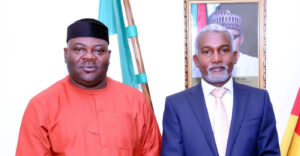The Embassy of Nigerian in Germany has denied issuing travel documents indiscriminately for the deportation of failed Nigerian asylum-seekers from the country.
Alhaji Mohammed Bello Musa Anka, Minister for Consular & Immigration, explained that before an Emergency Travel Certificate (ETC) is issued the recipient must have been interviewed by officials of the embassy to ascertain that they’re indeed Nigerians and that they’re legitimate grounds for their repatriation.
Minister Anka made the clarification while speaking during a meeting between the Edo State Commissioner of Local Government and Community Affairs, Hon. Monday Osaigbovo, and Nigeria’s Ambassador to Germany, HE Alhaji Maitama Tuggar, in Berlin recently.
The diplomat, who was asked by Ambassador Tuggar to comment on the issue, further explained that the embassy had an obligation to issue an ETC if the Nigerian to be deported had exhausted all legal possibilities of staying in Germany.

“We have no right to prevent a Nigerian without residency rights or who has exhausted all legal efforts to stay in the country from being sent back to Nigeria,” he added.
According to the figures made available to the embassy by the German authorities, Minister Anka said there’re 75,000 Nigerians living in Germany, out of whom 21,000 are asylum-seekers while 2,000 are students. The envoy disclosed that the mission had been informed that there were 1,200 Nigerians who must leave the country.
“There’s a lot of a misconception about the embassy in the Nigerian community,” he admitted, drawing attention to a recent video circulated on social media in which a woman accused the embassy of having issued blank ETCs to the German authorities for the purpose of deporting Nigerians, whose asylum claims had been rejected. He described the video as grossly misleading as what is alleged in it goes contrary to the practice in the issuance of travel documents.
Minister Anka said the new German labour migration law, which will enter into force early next year, was made to discourage irregular migration as it provides opportunity for young people with the needed skills to come to Germany legally to work.

The embassy had been having difficulties collecting its own statistics of Nigerians in Germany, Mr Anka said. “Efforts to register Nigerians have been frustrated by lack of co-operation,” he revealed, adding that the embassy had contacted Nigerian associations to provide the list of their members to augment the database of the embassy but their response had been lukewarm.
Mr Anka called for closer collaboration between Nigerian associations and the mission so that it could serve the community better.
Commissioner Osaigbovo paid a courtesy call on Ambassador Tuggar in his office in Berlin on 2 December. The commissioner was in Germany to seek greater co-operation with the German authorities and the Nigerian embassy on the issues of migration and the repatriation of historical artefacts from the former Kingdom of Benin in German museums.
Osaigbovo, who was accompanied on his visit to the ambassador by Edo community leaders in Germany, including Barrister Efosa Ogieriakhi, president of Edo in Diaspora Worldwide, Mr Austin Imade, Director of Edo Festival of Arts and Culture Germany, said the administration of Governor Godwin Obaseki was reviving technical education in Edo State to equip youths with skills that would enable them become gainfully employed.
READ ALSO Edo Commissioner visits Nigerian Ambassador in Germany on Benin Artworks..
He attributed high unemployment, a driver of irregular migration, to the fact that economic growth lagged population growth in Nigeria, which is why government is making efforts to attract investments to Edo State.

Ambassador Tuggar advised the commissioner to seek the assistance of the German government in its efforts to promote vocational education, while revealing that most Nigerians interviewed by the embassy for the issuance of travel certificates for deportation were not educated. “So what the Edo State government is doing to encourage dual-vocational education is good,” he added.
Speaking at the event, Austin Imade announced that the Edo community would host the first Edo Festival of Arts and Culture next year and he sought the co-operation of the embassy on the event.
The ambassador received the Edo commissioner’s delegation in the company of principal officials of the Embassy, including Alhaji Anka, Mr Peter J. Lambat, Minister/Information, Culture & Education and Mrs Foluke Atanda, Head of Chancery.
Femi Awoniyi
 THE AFRICAN COURIER. Reporting Africa and its Diaspora! The African Courier is an international magazine published in Germany to report on Africa and the Diaspora African experience. The first issue of the bimonthly magazine appeared on the newsstands on 15 February 1998. The African Courier is a communication forum for European-African political, economic and cultural exchanges, and a voice for Africa in Europe.
THE AFRICAN COURIER. Reporting Africa and its Diaspora! The African Courier is an international magazine published in Germany to report on Africa and the Diaspora African experience. The first issue of the bimonthly magazine appeared on the newsstands on 15 February 1998. The African Courier is a communication forum for European-African political, economic and cultural exchanges, and a voice for Africa in Europe.

































